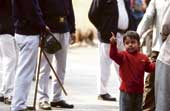 |
| Transparent plan: A glass and steel booth designed for greater police penetration in the city (Photo: Rashbehari Das) |
How often have you heard about midnight robberies, late police arrivals and wished your house was nearer the police station? And how frequently have you read about the police refusing to register a complaint because it was too late at night and the officer-on-duty was sleeping blissfully in some corner of the station? In Calcutta, they say, when the city sleeps, the policeman goes to bed as well.
But things could change from July. Police stations are coming closer to your place ? right to your nearest crossing or the slum half-a-kilometre down the road. These are going to be miniature versions of police stations ? or kiosks ? to be set up at 80-85 locations all over the city. They will keep vigil throughout the night and help people in distress ? what police stations are supposed to do anyway but seldom manage with any fair degree of efficiency.
The fibreglass kiosks will be manned by policemen from the local station and equipped with the latest communication gadgets. “The idea is to penetrate deeper into areas where it could take time for the police to reach,” says commissioner of police Prasun Mukherjee, who mooted the plan.
“They will provide all kinds of assistance. They will help arrange ambulances, ferry accident victims to hospitals and even organise blood transfusions. That apart, all complaints will be registered immediately and the police personnel at the kiosk will readily swing into action,” he adds.
The kiosks will have back-up in the form of 40 night patrolling vehicles that will criss-cross the city from seven in the evening till five the next morning. They will be connected to the kiosks through wireless equipment. The kiosks in turn will be linked to the police headquarters in Lalbazar.
When a complaint is lodged, policemen will be despatched to the trouble spot, the patrolling vehicles and headquarters will be informed and escape routes (in case of a robbery) from the area will be sealed off. In case of an accident, the victims will be rushed to the nearest hospital either in vehicles stationed at the kiosk or in ambulances arranged by the police. These will also provide first-aid.
From the dingy bylanes of Chitpur, the slums of Patipukur and Beleghata, to downtown Chowringhee and Park Street, the kiosks will be well connected. “There won’t be more than three to four policemen in each of them. But the gadgets will ensure that additional forces are called in at the earliest. More than anything else, the kiosks will serve as an assurance to the public that the police is at hand and ready to act ? even at odd hours,” says joint commissioner (administration) Kuldiep Singh.
But will they be able to pull it off? “Just a few scattered police posts could mean absolutely nothing,” feels Tarun Roy. The executive has cause for cynicism: he was once turned away from a police station where he had gone to lodge a complaint. “In fact, it might be more useful for the police than the common people. I don’t think the police is going to become more efficient because of a few kiosks.”
Prabir Basu, working president of the Bengal Federation of Consumers’ Organisations, agrees. “On paper, the idea seems excellent. But, unfortunately, the police have no accountability. They don’t charge any money from you for their services, so you can’t drag them to a consumer court anyway. And the human rights commission has not been able to make a difference. Let’s hope the kiosks will lead to a change,” he says.
According to Singh, they will. Kiosks, he says, have been hugely successful in cities abroad, including New York. “Calcutta’s kiosks will set a trend for other Indian cities to follow,” he says.
What about the perception that the police are already understaffed? “We have enough manpower,” asserts joint commissioner Zulfikar Hassan. “If there’s a dearth of staff, we’ll employ men from the battalions.”
For the police, the kiosks will not come at a price. A private company has promised to bear the entire cost, raising money by selling advertisement space on the kiosks. A telecom company has already bought 40 per cent of the ad space.
“We are now planning to insure the kiosks, because stones and other missiles are bound to be hurled at them during trouble,” Mukherjee adds in a lighter vein.
But if everything goes according to plan, the kiosks themselves should serve the public as an insurance again- st danger.
friendly neighbours
FAR AND WIDE: The kiosks will cover all the five divisions in the city — north, south, east, west and central. All major intersections — such as Shyambazar, Ultadanga, Belgac-
hia, Park Street and Chowringhee — will have at least one kiosk each, either right at the junction or close to it.
SOFT SPOTS: All sensitive areas will have at least one kiosk. There could be several under one police station, depending on the importance and crime graph of the location.
WAIT AND WATCH: The authorities believe their staff don’t need special training — at least not at the moment. “We have enough manpower and they are trained to handle the equipment. We might upgrade the facilities, after which training might be needed. But that’s for later,” says commissioner of police Prasun Mukherjee. The police assistance booths, most of which were non-function-al, will now make way for the kiosks.










